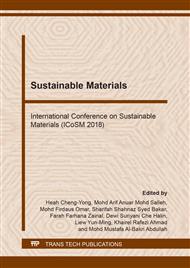p.353
p.361
p.368
p.374
p.385
p.393
p.399
p.410
p.415
Synthesis and Characterisation of Carbon Nanomaterials (CNMs) Using Polypropylene(PP) Waste as Carbon Precursor: Effect of Reactor Temperature
Abstract:
Fully utilisation of urban wastes such as polymer waste is considered as promising step to save the environment besides contributing to the production of Carbon Nanomaterials (CNMs) and their insight in mechanism involved. In this work, CNMs were successfully synthesised using polypropylene (PP) waste as carbon precursor via Chemical Vapour Deposition (CVD). Ferrocene was used as metal catalyst whereas argon was used as purging gas. The CVD were operated at various reactor temperatures to assess the possibility of CNMs growth at 600°C, 700°C, 800°C, 900°C, and 1000°C. The reaction time and argon flow rate were fixed at 90 minutes and 85 ml/min, respectively. The production of CNMs started at reactor temperature of 700°C and increased steadily from 0.0178 g to 0.2950 g with elevated temperature up to 1000°C. The diameter distribution of synthesised-CNMs reduced with the increased of reactor temperature. The XRD patterns revealed a sharp diffraction peak at around 26o (002) and broad diffraction peak at around 44o (111) which was proven to be Carbon Nanotubes (CNTs). Reactor temperature of 800°C considered as the best temperature to synthesis small diameter of CNMs in high quantity.
Info:
Periodical:
Pages:
385-392
DOI:
Citation:
Online since:
August 2018
Authors:
Price:
Сopyright:
© 2018 Trans Tech Publications Ltd. All Rights Reserved
Share:
Citation:


